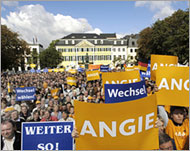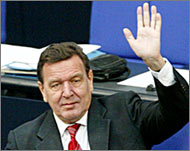Merkel is Germany’s new chancellor
Angela Merkel has been elected Germany’s first woman chancellor by an overwhelming majority of deputies in the Bundestag lower house of parliament.

The conservative Merkel won 397 votes in the 614-seat Bundestag lower house of parliament on Tuesday, easily securing the majority she needed to become Germany’s eighth post-war chancellor.
The vote makes her the first German chancellor to have grown up in the former communist east, and bring to an end months of political uncertainty that followed an inconclusive 18 September general election.
But a majority of Germans are convinced the conservative leader will not last a full four-year term because of her unwieldy alliance with the SPD of outgoing Chancellor Gerhard Schroeder.
Objectives
Merkel was forced during month-long coalition talks to scrap her plans for a major shake-up of the German social welfare system that had been a cornerstone of her election programme.
 |
|
Merkel has promised voters an |
She is vowing to revive the economy, once Europe’s motor but now one of the weakest in the 25-nation EU, and cut unemployment that hit post-war highs under Schroeder.
She also wants to repair relations with Washington, strained by Schroeder’s opposition to the US-led war in Iraq.
But she will be governing with a moderate coalition programme that suggests continuity rather than a dramatic break from Schroeder, who implemented tentative reforms himself.
“Merkel’s challenge is to break the restraints of the coalition agreement while convincing the SPD that the reform course of Schroeder is being continued, not that the conservatives are having their way,” conservative German daily Die Welt said in an editorial on Tuesday.
Break in style
Merkel and her cross-party cabinet of conservatives and Social Democrats (SPD) will be sworn in later on Tuesday, formally taking over from the SPD-Greens government that Schroeder has led for the past seven years.
 |
|
Schroeder led the SPD-Greens |
Merkel represents a generational change and a break in style from the flamboyant Schroeder, who favoured Italian suits and fat cigars and seemed most at ease when in the media spotlight.
Her clinical, almost shy approach, has been mocked in the German media, but some commentators believe it is tailor-made for her new “grand coalition” that bridges right and left and will require delicate management.
“Her dislike of the theatrical in politics, of the show and big words, fits with the new sobriety of Germany’s younger generation,” said German daily newspaper Handelsblatt.
Underestimated
Like her political mentor, former Chancellor Helmut Kohl, Merkel has been underestimated throughout her career.
That helped her push aside rivals in her male-dominated, heavily Catholic CDU, and may play to her advantage again.
Her cabinet is dominated by pragmatists, and the stability of her government could also be helped by a strong sense within the two camps in the coalition that failure would prompt voters to abandon them in any early elections.
Merkel has made cutting unemployment a top priority, and the handling of this goal could determine the fate of her government.
She must hope that the central plank of her coalition programme – an agreement to bring the budget deficit back within EU borrowing limits by 2007 mainly through higher sales taxes – will not get in the way of achieving her target.